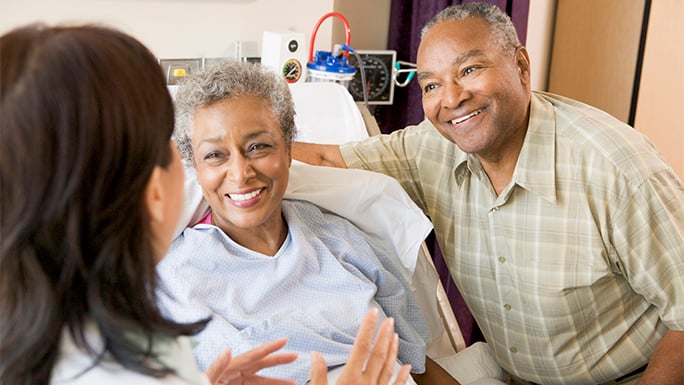Visitation Guidelines

Our goal is to provide a safe and healing environment for patients, family members, and other partners in care, as defined by the patient. Friends, family, and caregivers are welcome as partners in the healing process.
Visiting Hours and Limitations
Visitor access may be restricted for safety, infection control, or other health-related reasons. Restrictions will be communicated clearly to patients and families.
Patients or their healthcare proxies have the right to withdraw or deny consent to visitation at any time. Any visitor restrictions placed by a patient will remain in effect for a minimum of 48 hours unless otherwise approved by unit leadership.
We do not restrict, limit or deny visiting based on age, race, religion, ethnicity, culture, language, sex, gender identity, sexual orientation, physical disability or mental disability.
Hyde Park Medical Campus
Visitor limits by department or unit:
- Adult Critical Care Units (ICU)
- 2 visitors (bedside), 2 visitors (waiting room)
-
Visiting hours: 9 am - 9 pm
- Adult Emergency Department*
- 1 visitor
- Adult Inpatient Units (CCD, Mitchell Hospital)
- 2 visitors
- Visiting hours: 9 am - 9 pm
- Perioperative/Procedural Areas
- 2 visitors
- Surgical Waiting Area
- 2 visitors
* Exceptions to the above may only be made by Charge Nurse; Assistant/Patient Care Manager; Patient Care Director, Senior Administrator On Call; Hospital Operations Administrator (when present) and Social Work for Pediatric patients; and must be communicated to the Public Safety Supervisor (or designee)
Comer Children's Hospital
- Visiting hours and guidelines
- Visitor limits by department or unit:
- Comer Children's Hospital - Inpatient: 4 visitors
- Comer Neonatal Intensive Care Unit: 2 visitors
- Comer Pediatric Emergency Department: 2 visitors
Family Birth Center - Hyde Park
- Visiting hours and guidelines
- Visitor limits by department or unit:
- Labor and Delivery: 3 visitors
- Family Birth Center ED: 1 visitor
- Mother/Baby Unit: 2 visitors (located in Mitchell Hospital)
UChicago Medicine Ingalls Memorial Hospital
Visitor Access
- Visitors must check in with Public Safety staff at designated entrances, including the Mitchell Lobby, Comer Lobby, CCD East and West Lobbies, Parking Garage B Bridge, DCAM to CCD Bridge, and emergency department main entrances.
- Visitors over the age of 18 must present a state-issued photo ID (e.g., driver’s license) to receive a visitor badge. If a visitor does not have a photo ID, Public Safety will verify their identity through alternative methods.
- Each visitor will receive a color-coded badge based on the building they are visiting. Badges are valid for 24 hours and must be prominently displayed at all times.
- Visitor access may be restricted for safety, infection control, or other health-related reasons. Restrictions will be communicated clearly to patients and families.
- For important details and updates about visitation guidelines by area and type of care, read:
- Comer Children's Hospital visitation guidelines
- Family Birth Center visitation guidelines
- Ingalls Memorial patient and visitor information
Visitor Responsibilities
To support the care, safety and privacy of all patients:
- Stay in the patient room or unit waiting area. This is to keep hallways clear for patient privacy and safety. If the patient needs help, use the room call light.
- Speak softly and do not make loud noises. We want to create a healing place for patients.
- Care team members may ask visitors to leave the room temporarily to provide optimal care for the patient or to address changing health care needs.
- Visitors are expected to monitor their behavior, including the tone and volume of conversations, phone calls, and use of electronic devices, to ensure a restful environment for all patients.
- Visitors with children must supervise them at all times. Children under 12 may have additional restrictions in certain areas, such as the NICU or perioperative units.
Respect, Dignity, Compassion and Kindness
At UChicago Medicine, respect, dignity, compassion and kindness are at the center of who we are.
Caring for others is our shared responsibility. We expect all people to be treated equally with respect.
This is a healing environment. Safety is important to us.
We do not allow or tolerate:
- Weapons, including guns and knives
- Threats of violence or verbal aggression
- Physical assaults and acts of violence
- Racist, discriminatory or offensive language and actions
- Abusive and harmful speech
- Sexual advances that are verbal or physical
Additionally:
- Acts of violence and physical assault are reported to police. Not following our policies may result in being removed from the building and other restrictions.
- Taking pictures or video of hospital staff is not allowed without their permission.
Thank you for respecting our patients, visitors and staff.
This notice is required by Illinois law.






